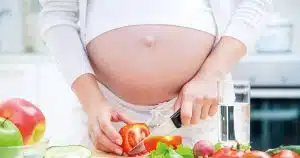I was diagnosed with PCOS in 2010 when I had difficulty falling pregnant. Although I always knew that something was wrong, getting the diagnosis was devastating.
It took 9 months for me to fall pregnant – not very long in the greater scheme of things and I’m very grateful that it was actually relatively quick. I know that there are many, many women out there who struggle to fall pregnant for much longer than that.

Before we have a look at some of the things we can all do to our PCOS and pregnancy plan, please remember that I am not a doctor and you should consult your doctor to find out what will work for you. I just want to share with you the things that I have found helpful personally and the things that I have researched regarding PCOS and Pregnancy.
Your PCOS Pregnancy Diet
You know how much I believe in the power of a PCOS diet and food to manage PCOS so it comes as no surprise that diet would be top of Everything we eat impacts on our hormones.
my list when it comes to improving fertility. Food is important because everything we eat impacts on our hormones, either helping to keep them in balance or throwing them off kilter.
Insulin and Testosterone
It is particularly important that insulin levels are managed as increased insulin causes increased testosterone production. These male hormones are decidedly unhelpful for fertility and conception! So, make sure you’re eating low GI carbs and are balancing your carbs with protein. The best PCOS Diet will give you more guidance on how to eat to manage your PCOS and pregnancy may just surprise you as your symptoms improve.
Estrogen
As with many other hormones, women with PCOS tend to have an imbalance in Estrogen levels. They can either be too high or too low. There are a number of factors that can lead to estrogen dominance and two of the big culprits are xeno-estrogens (estrogen from the environment such as plastics, cosmetics, etc) and estrogen from animal products. The xeno-estrogens in the environment is a whole discussion on it’s own so I’ll do an article on that soon.
One way that we can manage excess estrogens is by considering estrogens in our diet. We get estrogen from two sources: plant (phytoestrogens) and animal sources.

However, there is also a theory that because the body sees that the receptors have these phytoestrogens, it realizes that it doesn’t need to produce as much estrogen and estrogen levels drop.
Research has shown that soy in particular can cause delayed ovulation. So, as I am trying for a baby, I have cut soy out of my diet completely.
Let’s have a look at estrogen from animal products. A lot of meat, beef in particular, contains hormones that have been given to the animal to increase yield and production. We then ingest these hormones (and other antibiotics) which can impact on our hormone balance.

I personally try to avoid all meat products (not always successfully though!) I want to know that what I’m putting into my body is going to help bring balance and that I’m not ADDING hormones to my already disordered system.
Weight Loss
Apart from trying to regain our hormone balance, diet is also key to loosing weight for women with PCOS. I know that it is incredibly hard to lose weight and is a struggle we face daily. However, research has shown that losing even 5-10% of our total body weight can help to restore our cycles and improve our chances of conceiving.
Supplements:
Supplements are an important aspect to our PCOS and Pregnancy plan. Women with PCOS have deficiencies in some vitamins and nutrients which could be impacting on our ability to conceive.
Multivitamin
A good multivitamin forms the foundation of any supplement and nutrition plan so make sure you take a good multivitamin everyday.
Chromium

Chromium can help improve fertility by lowering insulin levels and therefore also lowering testosterone levels.
If you are already taking insulin-sensitising drugs, make sure you speak to your doctor before taking Chromium supplements. Taking both can cause your blood sugar levels to drop too much.
Vitamin D and Calcium
I have mentioned the importance of Vitamin D and Calcium supplements here, but Vitamin D is important for insulin resistance, breast health, mood and weight loss. Women with PCOS are often deficient in this important Vitamin and research has shown that supplementing with Vitamin D and Calcium helps to regulate menstrual cycles and improve the number of mature follicles.
Mature follicles and a more regular menstrual cycle sounds great for improved fertility!
Vitamin B

Folic acid, or Vitamin B9, is also an essential supplement during the early stages of pregnancy as it helps with the development of the neural tube and can help prevent spina bifida in your baby.
I take a Vitamin B complex supplement every day to make sure that I’m getting all of the essential Vitamin B that I need.
Omega 3
I have also recently written an article on the importance of Omega 3. Omega 3 and essential fatty acids are important as they are an essential component of hormones and Omega 3 in particular has been shown to lower testosterone in women with PCOS.
Lower testosterone is not only great for improving fertility but also for managing some of those other pesky symptoms of PCOS.
Supplements are an important element to your PCOS and pregnancy plan.
Summing up
So, to sum it all up, these are the steps that I am taking to improve my diet and my chances of pregnancy with PCOS:
- Balance carbs with protein
- Eat low GI carbs
- Eat organic, pasture fed meat
- Eat more plant based proteins if you can’t afford organic meat
- Avoid soy and soy products
- Make sure you’re taking supplements
You may also find this article on pregnancy risk factors for PCOS interesting…
I don’t know about you but I want to give my body and my baby the best chance, not only of conceiving but having a healthy and happy pregnancy!
I’d love to hear about the things you are doing to improve your chances of pregnancy with PCOS! Drop me a comment below!
- sustainable pcos weight loss strategies
- Over 5500 women have done it and seen results
- [bonus] combat cravings kit
- [bonus] intermittent fasting for pcos course
- [BONUS] personalised nutrition plan
JOIN OVER 5,500 OTHERS






